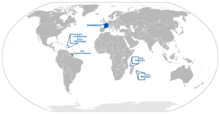Overseas department
As Overseas Territory and overseas region ( French départements et régions d'outre-mer , acronym DROM or DOM-ROM ), some departments of the French Republic referred to the outside metropolitan France (métropolitaine France) , the European motherland, are and thus belong to the French overseas territories . The DROM or DOM-ROM are former French colonies that became Départements d'outre-mer after the Second World War . The areas are both a region and a département, but partly (DROM) with separate administration of these regional authorities. They also represent the NUTS 2 and 3 levels of the official NUTS breakdown of France .
DOM stands for the characteristics of the individual territories as well as for the départements [et régions] d'outre-mer in their entirety. As such, they form a NUTS 1 region .
In addition to the DOM, there are also the Collectivités d'outre-mer (COM) and other special forms of the overseas territories outside of France métropolitaine . The island of Corsica is not a DROM, but belongs to France métropolitaine .
term
Due to the high transfer payments from the European Union and France, which ensure a relatively high standard of living compared to the surrounding area, particularly strong movements for independence have never formed in the DROM or DOM-ROM. Neither in France nor in the European Union is this particular status, which can be seen as a holdover from French colonialism , in question.
The total population of the French overseas departments is around 2.06 million people (January 2010).
organization


DROM means that the Département and Région coexist as separate local authorities , with competencies being shared between the Départementrat and the regional council . According to Article 73, last paragraph of the Constitution of the Fifth French Republic , the Département and Région can be merged into a single regional body with a single consultative assembly (DOM-ROM), which requires a referendum. The first local authority of this type has been Mayotte since March 2011 .
On January 24, 2010, voters in Martinique and French Guiana also voted for the merger. In Martinique it was the second referendum on this subject. On December 7, 2003, voters in Guadeloupe had spoken out clearly and in Martinique against the merger.
As part of France, the DOM are part of the European Union; the currency is the euro . There are only a few exceptions with regard to customs duties and sales taxes. The overseas departments are also not part of the Schengen area . Belonging to France and thus to the European Union is also reflected on the euro banknotes : the overseas departments (with the exception of Mayotte, which was added on March 31, 2011) are shown on the back of the banknotes with the corresponding map sections - bottom left of the map of Europe.
With the introduction of the second series of euro banknotes from 2013, Mayotte could have been displayed alongside the other overseas departments, as the design was completely redesigned. The addition of Mayotte as a secondary card did not happen, however, so that at least in the second series one can speak of an error due to the lack of a card of Mayotte.
list
The overseas departments and their representation in the National Assembly and Senate :
| Department | number | ISO-3166-2 code | NUTS code | coat of arms | Flag (as DOM / ROM) |
stand-in |
|---|---|---|---|---|---|---|
| Guadeloupe | 971 | FR-GP | FRY1 [0] |
|
since 1946, 4 MPs, 2 senators | |
| Martinique | 972 | FR-MQ | FRY2 [0] |
|
since 1946, 4 MPs, 2 senators | |
|
French Guiana (Guyane française) |
973 | FR-GF | FRY3 [0] |
|
since 1947, 2 deputies, 2 senators | |
| Reunion | 974 | FR-RE | FRY4 [0] |
|
since 1946, 5 MPs, 3 senators | |
| Mayotte | 976 | FR-YT | FRY5 [0] |
|
since 2011, 1 MP, 2 senators |
The four-digit NUTS code designates the region , the five-digit the department .
Web links
Individual evidence
- ^ French Embassy in Germany: Mayotte Island becomes the 101st French department. www.botschaft-frankreich.de, December 27, 2010, archived from the original on December 31, 2010 ; Retrieved January 1, 2011 .
- ↑ Martiniquais et Guayanais choisissent la collectivité unique. In: Le Monde , January 25, 2010 (French)
